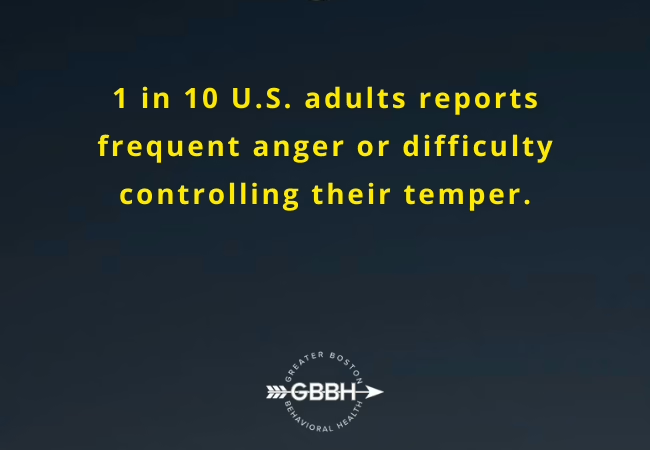Anger is a normal and even healthy emotion when it is managed properly. It can alert us to injustice, help us stand up for ourselves, and motivate change. However, when anger becomes excessive, uncontrolled, or misdirected, it can wreak havoc on your health, relationships, and quality of life.
At Greater Boston Behavioral Health, we recognize that unresolved anger is often a symptom of deeper emotional or psychological struggles. That’s why we offer comprehensive Anger Management Therapy in Boston as part of our holistic approach to mental health care. Our goal is not to eliminate anger—but to help individuals understand it, control it, and express it in healthier, more productive ways.
Why Do People Need Anger Management Therapy?
Contrary to the stereotype, anger management therapy isn’t just for individuals who have violent outbursts or legal issues. It’s for anyone whose anger is interfering with their ability to live a happy, stable, and connected life.
People seek anger management therapy for a variety of reasons, including:
- Frequent arguments or blowups at home or work
- Difficulty communicating emotions without yelling or shutting down
- Legal problems due to domestic disputes or road rage
- Damaged relationships due to temper issues
- Health concerns like high blood pressure or headaches linked to chronic anger
- Emotional pain or guilt after angry episodes
Uncontrolled anger can be a standalone issue, or it may be a symptom of a broader mental health condition, such as:
- Depression
- Anxiety disorders
- PTSD and unresolved trauma
- Bipolar disorder
- Substance use disorders
- Personality disorders (such as borderline or narcissistic personality disorder)
At Greater Boston Behavioral Health, our approach is rooted in understanding the whole person, not just the symptoms. That’s why anger management therapy is fully integrated into our larger Mental Health Programs in Boston, which include therapy, medication management, psychiatric care, and wellness support.
What Is Anger Management Therapy?
Anger management therapy is a specialized form of psychological treatment that helps individuals:
- Recognize the early signs of anger
- Understand the emotional and cognitive roots of their reactions
- Develop healthy coping strategies
- Improve communication and conflict-resolution skills
- Reduce emotional reactivity over time
This therapy typically uses a blend of evidence-based modalities, including:
- Cognitive Behavioral Therapy (CBT): Focuses on identifying and changing distorted thinking patterns that fuel anger.
- Dialectical Behavior Therapy (DBT): Enhances emotional regulation and teaches mindfulness and interpersonal effectiveness.
- Trauma-informed therapy: Helps address underlying pain that contributes to chronic irritability and anger.
- Mindfulness and relaxation training: Reduces the physiological arousal (e.g., racing heart, muscle tension) associated with anger.
- Behavioral rehearsal and role-play: Builds new, more constructive habits in a safe therapeutic setting.
How Does Anger Management Therapy Work?
The therapy process generally follows a progression of stages. At Greater Boston Behavioral Health, we tailor each stage to the individual’s needs and offer multiple levels of care—from outpatient sessions to more intensive support through our Partial Hospitalization Program in Boston or Intensive Outpatient Program in Boston.
1. Initial Assessment and Diagnosis
The journey begins with a comprehensive intake evaluation at our Mental Health Treatment Center in Boston. A licensed therapist or clinical team member will assess:
- The frequency, intensity, and impact of your anger
- Personal and family history of mental health issues
- Medical concerns related to stress or rage
- Previous treatment attempts
- Trauma history and risk factors
This helps us understand whether anger is the core issue or a symptom of something more complex. We then develop a customized treatment plan and recommend the appropriate level of care.
2. Identifying Triggers and Patterns
Many people feel like their anger “comes out of nowhere,” but anger almost always follows a pattern. Therapy helps clients:
- Identify the situations, people, or thoughts that trigger their anger
- Understand how unresolved past events shape their emotional responses
- Keep a “thought log” or “anger diary” to track recurring themes
- Notice physical signs of escalation (e.g., clenched fists, flushed skin, rapid heartbeat)
This self-awareness is a crucial step in learning how to interrupt the cycle before it spirals out of control.
3. Cognitive Restructuring
At the heart of anger is often distorted thinking: “They disrespected me,” “No one listens to me,” or “I’m always being mistreated.” CBT techniques are used to:
- Challenge all-or-nothing thinking
- Reframe situations more objectively
- Cultivate more balanced inner dialogue
- Replace reactive thoughts with proactive ones
This work is ongoing and often takes place in both individual and group therapy sessions. These concepts are reinforced in higher-level programs like our Inpatient Treatment Program in Boston and Residential Treatment Program in Boston, where clients have daily opportunities to practice and reflect.
4. Learning Emotional Regulation Skills
Anger is often a secondary emotion—it covers up fear, shame, sadness, or helplessness. Therapy helps clients:
- Build a “vocabulary of emotions” to articulate their feelings
- Practice distress tolerance and calming techniques
- Learn to pause before reacting
- Use visualization and grounding tools to soothe themselves in moments of crisis
Our Mental Therapy Programs in Boston place a strong emphasis on skill-building and daily mindfulness, empowering clients to stay centered even in challenging moments.
5. Improving Communication and Relationship Dynamics
Unmanaged anger often damages relationships—whether with partners, children, coworkers, or friends. Our therapists provide tools to:
- Express needs assertively, not aggressively
- Navigate disagreements without escalating
- Set healthy boundaries
- Repair ruptures in trust caused by previous anger episodes
These skills are taught through role-play, group work, and even family therapy sessions in our more immersive programs, such as our Residential Treatment Program in Boston.
6. Ongoing Support, Aftercare, and Psychiatric Integration
Managing anger is a lifelong practice. After completing a structured anger management program, many clients benefit from continued support in the form of:
- Weekly or bi-weekly outpatient therapy
- Medication support through our Psychiatric Care in Boston team
- Group therapy or anger management classes
- Participation in ongoing IOP or alumni programs
Our aftercare planning ensures that clients are never left without support when they transition out of formal treatment.

What Programs Offer Anger Management at Greater Boston Behavioral Health?
We provide anger management therapy across a full continuum of care:
Outpatient Therapy
Ideal for individuals with mild symptoms or those stepping down from more intensive care. Therapy may occur weekly and focus on building skills and resolving root issues.
Intensive Outpatient Program in Boston (IOP)
Best for those who need regular support but still want to maintain daily routines like work or school. Sessions occur 3–5 days per week.
Partial Hospitalization Program in Boston (PHP)
Offers daily, structured support and is effective for individuals with moderate to severe anger issues, especially if compounded by other mental health conditions.
Inpatient Treatment Program in Boston
Short-term stabilization in a safe environment for those in crisis or whose behavior poses a risk to themselves or others.
Residential Treatment Program in Boston
Provides immersive care with 24/7 supervision and a comprehensive therapy schedule. Ideal for individuals needing long-term behavioral change and deep emotional healing.
Key Benefits of Anger Management Therapy
By participating in Anger Management Therapy in Boston at Greater Boston Behavioral Health, individuals gain:
- Greater emotional self-awareness
- Reduced frequency and intensity of angry episodes
- Stronger personal and professional relationships
- Enhanced ability to handle stress and conflict
- Better physical health (lower blood pressure, fewer stress-related symptoms)
- Increased confidence and control over daily life
Ultimately, clients are not just “managing” anger—they’re transforming it into emotional intelligence, resilience, and self-respect.
Conclusion
If you’re tired of feeling out of control, hurting people you care about, or watching your life unravel because of unchecked anger, it’s time to seek help. Greater Boston Behavioral Health offers expert, compassionate Anger Management Therapy in Boston, backed by proven treatment methods and personalized care.
Whether you’re best suited for outpatient counseling or need more structured support through a Partial Hospitalization Program in Boston, our team will guide you every step of the way. Call us today at (888) 278-0716 to schedule your confidential consultation and begin your journey toward balance, healing, and emotional strength.
Frequently Asked Questions (FAQ)
Who should consider Anger Management Therapy?
Anyone who finds that their anger is negatively affecting their relationships, work life, physical health, or overall well-being can benefit. You don’t need to have had a violent outburst—therapy is for those who want to better understand and control their emotions.
How long does anger management therapy take?
Anger management therapy programs typically last 8 to 16 weeks, but duration varies depending on individual needs and the level of care—such as outpatient therapy, a Partial Hospitalization Program in Boston, or a Residential Treatment Program in Boston.
What techniques are used in Anger Management Therapy?
Therapists use evidence-based approaches like Cognitive Behavioral Therapy (CBT), Dialectical Behavior Therapy (DBT), mindfulness techniques, stress management, and communication skills training to help individuals control their anger responses.
Is medication part of anger management treatment?
Medication is not always necessary but may be prescribed if anger is related to a mental health condition such as depression, anxiety, or bipolar disorder. Our Psychiatric Care in Boston team provides comprehensive evaluations and medication management when needed.
Can I attend therapy while working or going to school?
Yes. Our Intensive Outpatient Program in Boston and outpatient therapy services are designed to be flexible so you can attend sessions while continuing your daily responsibilities.
Do you offer court-ordered anger management programs?
Yes, we work with clients who are mandated by the courts to complete anger management therapy. We provide progress reports and documentation as needed while delivering respectful, individualized care.
What happens after I complete anger management therapy?
After completing your program, we help you develop a personalized aftercare plan, which may include continued outpatient therapy, group sessions, or psychiatric follow-ups through our broader Mental Health Programs in Boston.
cantiktoto
restoslot4d
totoagung
restoslot4d
situs toto
sakuratoto
totoagung
amintoto
totoagung slot
totoagung
slotgacor4d
amintoto
restoslot4d
totoagung
slotgacor4d
slotgacor4d
restoslot4d
daftar slot gacor
slot gacor 4d
totoagung2
amintoto
amintoto
cantiktoto
situs toto slot
slotgacor4d
slotgacor4d
amintoto
qdal88
qdal88
restoslot4d
amintoto
sakuratoto3
slotgacor4d
toto slot
amintoto
idn slot
amintoto
slotgacor4d
situs toto
slotgacor4d

